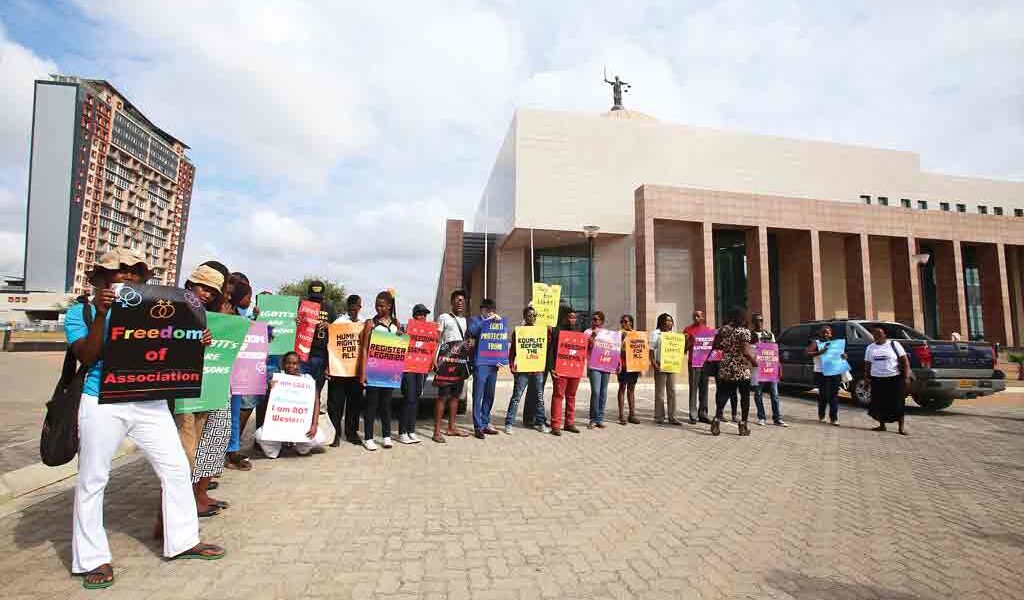Vows to oppose Masisi, High Court landmark ruling
It is the Church versus the State as President Mokgweetsi Masisi sees no sacred cows and aims to protect the rights of same sex couples while the Church sees a return to Sodom and Gomorra and will have none of it, writes TLOTLO KEBINAKGABO.
Pastor Tebogo Motlhagodi of the Botswana Networking Christian Community (BONECO) says his organisation will not rest until the country’s moral compass is restored and same sex relationships and marriages are outlawed again.
Although Botswana is a secular state, the country is predominantly Christian on the side of a theological conservatism similar to the religious right of the West that supports parochial – and racist figures.
But in a highly controversial landmark decision, the High Court recently ruled to decriminalise consensual same-sex relationships on the grounds that the law does not have a place in the bedroom. Soon afterwards, President Mokgweetsi Masisi made it known that he would protect the rights of people in same sex relationships.
Delivering the contentious judgement, Justice Michael Leburu of High Court said it was important to embrace people’s sexual identities and to acknowledge that homosexuality is neither a choice nor a fashion statement.
Speaking in an interview with The Botswana Gazette yesterday (Monday), Pastor Motlhagodi said the Church stood firm that it would not condone sexual relations between individuals of the same sex. He added that Botswana must avoid the temptation of keeping up with trends around the world.
“I think our culture and tradition do not also agree with that,” he said. “It is the same with the word of God.”
When he spoke with The Botswana Gazette, BONECO was yet to meet on the matter but the man of divinity was certain of what position the Church would take, saying after its meeting his organisation would release a statement. BONECO is the umbrella body for the Botswana Council of Churches (BCC), the Organisation of Africa Instituted Churches (OAIC) and the Evangelical Fellowship of Botswana and speaks on behalf of all Christian formations.
As pronounced by Pastor Motlhagodi, BONECO’s stand is diametrically opposed to President Mokgweetsi Masisi’s position.
“There are also many people (in) same sex relationships in this country who have been violated and have also suffered in silence for fear of being discriminated (against),” he said in November last year to mark the beginning of 16 Days of Activism Against Violence on Women and Children. “Just like other citizens, they deserve to have their rights protected.”
Following the controversial High Court ruling on Tuesday last week, the ruling Botswana Democratic Party declared itself as being in support of it. The BDP wrote in its official Facebook page that it continued to engage Batswana to ensure that no one felt discriminated against irrespective of their race, ethnicity, creed, gender or sexual preference.
“This we will achieve through the promotion of diversity, inclusion, open-mindedness, tolerance, protecting human rights and upholding good governance in order to achieve prosperity and a progressive future for all our citizens,” it said.
On the international front, the judgement was also met with enthusiastic approval rights groups like Amnesty International which said the decision marked an exciting new era of acceptance that should motivate other African countries to follow in Botswana’s footsteps.
Said Amnesty’s deputy director for southern Africa, Muleya Mwananyanda, in a statement last week: “The court judgement sends a strong message that no one should be harassed, discriminated against or criminalised because of their sexual orientation. With this ruling, Botswana has said ‘no’ to intolerance and hate and ‘yes’ to hope and equality for all people.”
Same-sex relationships are illegal in more than 70 countries worldwide, almost half of them in Africa where homosexuality is widely shunned. Botswana is the latest African country to decriminalise homosexuality and follows countries like Angola which did so in January, the Seychelles in June 2016, Mozambique in June 2015 and Lesotho in 2012.
Before the judgement, Botswana’s penal code had outlawed “carnal knowledge of any person against the order of nature” with those convicted facing up to seven years in prison while “indecent practices between persons” in public or in privacy were punishable by up to two years in prison.

